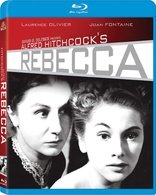Rebecca Blu-ray Movie
HomeRebecca Blu-ray Movie 
Metro-Goldwyn-Mayer | 1940 | 131 min | Not rated | Jan 24, 2012Movie rating
8.3 | / 10 |
Blu-ray rating
| Users | 4.7 | |
| Reviewer | 4.0 | |
| Overall | 4.0 |
Overview
Rebecca (1940)
A young bride is terrorized by the memories of her husband's glamorous first wife.
Starring: Laurence Olivier, Joan Fontaine, George Sanders (I), Judith Anderson, Nigel BruceDirector: Alfred Hitchcock
| Drama | Uncertain |
| Romance | Uncertain |
| Psychological thriller | Uncertain |
| Mystery | Uncertain |
| Thriller | Uncertain |
Specifications
Video
Video codec: MPEG-4 AVC
Video resolution: 1080p
Aspect ratio: 1.37:1
Original aspect ratio: 1.37:1
Audio
English: DTS-HD Master Audio 2.0 Mono (48kHz, 24-bit)
Music: Dolby Digital 2.0
Mono is dual-encoded
Subtitles
English SDH
Discs
50GB Blu-ray Disc
Single disc (1 BD)
Playback
Region free
Review
Rating summary
| Movie | 3.5 | |
| Video | 4.0 | |
| Audio | 3.5 | |
| Extras | 3.5 | |
| Overall | 4.0 |
Rebecca Blu-ray Movie Review
Hitch hits Hollywood.
Reviewed by Jeffrey Kauffman January 16, 2012Was it fate or uncharacteristic bad judgment which led Alfred Hitchcock to accept David O. Selznick’s entreaties to Hitch
to leave his native England and come to the Promised Land of Hollywood? Hitch had been approached before—several
times in fact—but had managed to resist the lure of untold riches and easy access to the world’s biggest stars. What
changed? Was it the considerable dough Selznick promised to throw at the director to make his move palatable? The
fact that Selznick was obviously extremely well connected to Hollywood royalty, and was in fact still a member, if only by
marriage, of one of the industry’s ruling elite families? Or was it perhaps the fact that Selznick also promised to launch
his vaunted star making machinery behind Hitchcock himself, making the director one of the very few of his craft to
achieve above the title prominence? Hitchcock was a self-promoter par excellence, and this fact may have
played into his decision at least as much as the one he told Richard Schickel, who contributes a delightful commentary
to this new Blu-ray release of Hitch’s first stateside film, and his first one under the producing aegis of Selznick,
Rebecca: namely, that the director simply wanted more equipment to work with.
Hitch and Selznick ended up
mixing like oil and water, and Ingrid Bergman is on record as stating that cameras magically “broke” whenever Selznick
would imperiously stride onto a shooting stage where Hitch was attempting to make a film. As soon as Selznick left, the
cameras just as magically started working again. Selznick, fueled by massive quantities of Benzedrine, ended up
treating Hitch, somewhat ironically, exactly as Hitch later was quoted as saying actors needed to be handled: as cattle,
being herded wherever they belonged. Hitch had been a huge fish in the rather small pond of the British film industry,
and it must have been a serious wake up call to find himself just another cog in the Hollywood machine, but that
doesn’t mean Rebecca doesn’t bear many of the signs of Hitch’s nascent mastery. Rebecca is in some
ways a rather odd property for Hitchcock to want to film (though according to Selznick, the director had in fact
attempted to procure the rights to Daphne DuMaurier’s novel while still in Britain, but wasn’t able to muster the financial
resources that Selznick had at his beck and call). This sort of neo-modern reimagining of Jane Eyre had a lot of
the psychological aspects that would come to define later Hitchcock, but it also features a bumbling, halting heroine,
one completely at odds with the usual Hitchcock Ice Goddess, coolly in control of all she surveys. And the purported
mystery at the heart of the story—did Max DeWinter kill his first wife?—is handled with kid gloves, without any real
shock value and in fact with the same sort of sanguine acceptance of motion picture code rules and regulations that
also hampered Hitchcock’s somewhat similarly themed Suspicion.

Rebecca is one of the more hotly debated films in Hitchcock's prolific output, but even those who admire the film (and I'm in that category) seem to recognize it's not one of the Master's masterpieces, and the fact is Hitchcock himself is on record in many interviews as stating that Rebecca, despite its reputation, not to mention its Best Film Oscar win (something in and of itself proof positive of Selznick’s political power in Hollywood at that time), wasn’t a happy experience for him and there were aspects of the film he didn’t like very much. Hitchcock’s early years in Hollywood were a learning experience, certainly not so much in terms of craft, which he already obviously had in abundance, but more so in the vagaries of who held the reins and what could actually be depicted on screen. Rebecca also had an extremely tumultuous pre-production period (one which Schickel gives some insight to in his commentary), with a veritable slew of writers thrown at the project to try to wrangle Daphne DuMaurier’s novel down to filmable size. That in turn gives the film a kind of schizoid quality at times, one which Hitch himself seemed to understand going in, as he casts the whole first segment of the film, roughly a half hour or so, as a kind of light, drawing room comedy of manners sort of outing before shifting gears rather dramatically once the nameless “I” heroine played by Joan Fontaine and her new husband Max DeWinter (Laurence Olivier) return to Max’s Gothic palace, Manderley. Hitch also simply didn't have the power at that point in his career to cross Selznick, especially with the producer just having come off the incredible triumph of Gone With the Wind.
When the film gets into its literally Gothic element, especially after the introduction of the nefarious Mrs. Danvers (Judith Anderson in an Oscar nominated turn), the film is indeed incredibly spooky and moody, but it’s also incredibly slow at times, something again that Schickel mentions and which Hitch himself seemed to be aware of. Part of this problem was due to the fact that Selznick, obviously never a laissez faire producer, wanted to cram as much of DuMaurier’s novel into the film adaptation as possible. Hitch of course seemed to realize that that would be impossible, and even more impossible would be the film’s central denouement, namely that Max DeWinter was a murderer, something the production code would certainly not permit, at least within the confines of a romantic thriller where the character was being portrayed as the putative, if tormented, hero of the piece. That left Hitchcock with the unenviable task of trying to instill the film with mood, even with less than desirable content. The good news here is that Rebecca is undeniably very moody, as Fontaine's character attempts to figure out what happened to Rebecca, Max's first wife, a woman who died under mysterious circumstances and who still seems to have a ghostly pull on Manderley and her inhabitants, including the creepy housekeeper, Mrs. Danvers.
Rebecca is a kind of odd film in Hitchcock’s oeuvre and one without any of the director’s iconic set pieces. Instead, we have three really interesting, if at times hyperbolic, performances from Fontaine, Olivier and Anderson. Fontaine was new to films, and was evidently shunned by the largely British (and very experienced) cast, but that may have played well into her portrayal of a halting, insecure young woman who finally, late in the film, comes into her own and more or less takes charge of an unsettling situation. Olivier is an odd hero in this film, one part Heathcliff and another part Hamlet, a Romantic (with a capital R) hero who is introspective, probably suicidal and certainly depressed. Max is really kind of a boor throughout much of the film, and Olivier does relatively little to soften that impression. Anderson chews the scenery with a fair degree of subtlety, all things considered, with a glowering, menacing presence that has become one of the legendary portrayals in all film (and which might be seen to influence such modern day depictions as O’Brien in the current smash Downton Abbey). But there’s little of the Hitchcock flair for big, technically amazing moments (aside, perhaps, from the climactic fire sequence), and those looking for telltale Hitchcock sequences may be somewhat disappointed in Rebecca’s relatively restrained ambience.
Rebecca Blu-ray Movie, Video Quality 
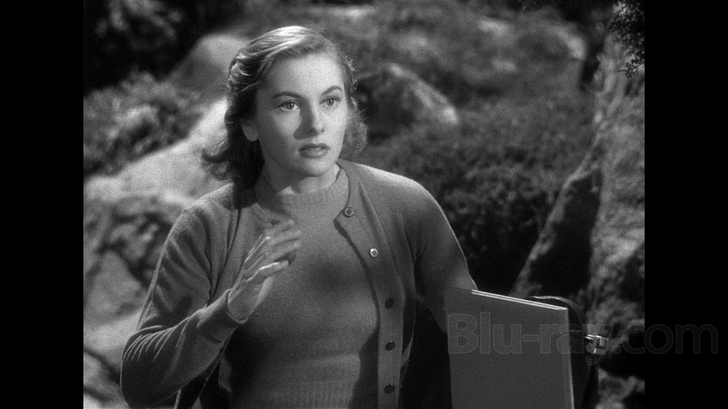
Rebecca is presented on Blu-ray courtesy of Fox-MGM with an AVC encoded 1080p transfer in 1.37:1. Of the three Hitchcock films being released simultaneously by Fox-MGM, Rebecca boasts the strongest overall transfer, probably due in no small part to the esteem in which the film has been held for so many years, leading to generally better preservation through the intervening decades since its original release. The source elements here are in fairly fine shape, though as with the two other Hitch releases, there are still occasional scratches and other damage that can easily be seen, and in fact Rebecca has a doozy of a scratch early in the film across Olivier's face as he stares at the roiling sea water right as he meets Fontaine. On the whole though, this transfer boasts really excellent sharpness and clarity and it also reproduces Hitch's mist-strewn shots of Manderley effortlessly. Contrast is very strong throughout this presentation, with deep, lustrous blacks and impressive variegation in gray scale. Grain is natural looking, with the notable exception of the film's opticals (which are fairly plentiful), when added grain and dirt adds a veiled layer over the image, as is to be expected.
Rebecca Blu-ray Movie, Audio Quality 
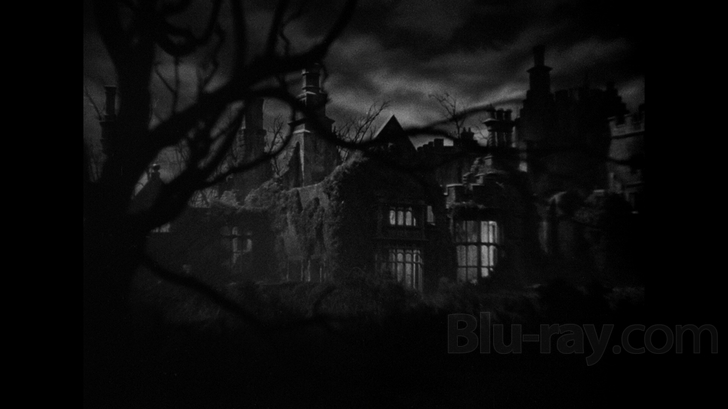
Rebecca's original mono soundtrack is delivered via a lossless DTS-HD Master 2.0 track that bears little signs of age, other than a bit of expected boxiness in overall tonal quality. This is one of the best, if not the best, sounding Blu-rays in this current slate of Hitch releases, with nice detail shining through, including lots of great effects like the surging sea water in the first scene and then of course the crackling flames in the final sequence. Dialogue and Franz Waxman's evocative score (also available as an isolated track, with effects) sound crisp and clear, though lower frequencies are just slightly clipped at times. As was the case with Notorious, Rebecca shows few signs of the hiss that was quite audible on the Spellbound release.
Rebecca Blu-ray Movie, Special Features and Extras 
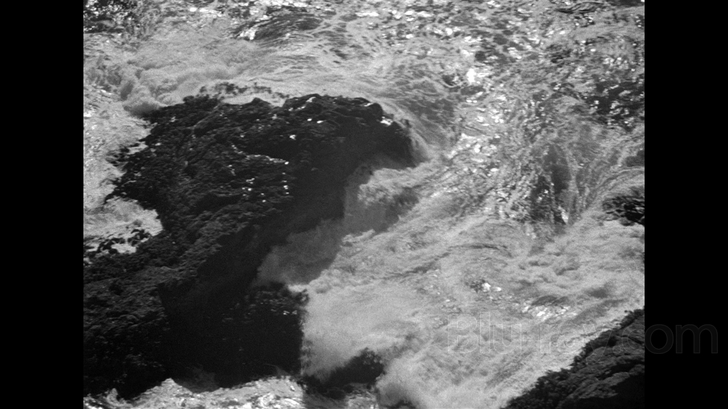
- Commentary by Richard Schickel. Schickel is an extremely affable, but unerringly informative, commentator, one who manages to couch his comments in anecdotes that bring several of these larger than life characters involved in the film fully alive.
- Isolated Music and Effects Track
- The Making of Rebecca (SD; 28:08) talks about the conflicts between Hitchcock and Selznick, as well Hitch's entrée into the Hollywood machine and the struggle to adapt DuMaurier's novel to the screen.
- The Gothic World of Daphne DuMaurier (SD; 19:02) is an interesting profile of Rebecca's author.
- Screen Tests (SD; 9:07) offers peeks at Margaret Sullavan and Vivien Leigh (with Laurence Olivier).
- Radio Plays features the original 1938 version starring Orson Welles (59:35); a 1941 Cecil B. DeMille version starring Ronald Colman, Ida Lupino and Judith Anderson (58:31); and a 1950 version with Laurence Olivier and Vivien Leigh (1:00:22).
- Hitchcock Audio Interviews includes chats with Peter Bogdanovich (4:20) and François Truffaut (9:15).
- Theatrical Trailer (SD; 2:22)
Rebecca Blu-ray Movie, Overall Score and Recommendation 
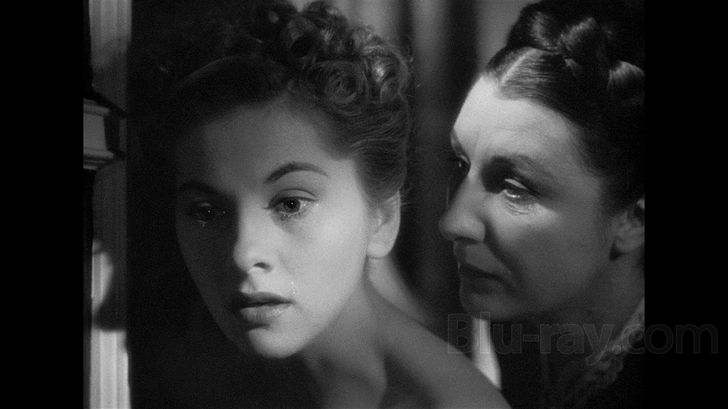
Those expecting a bristling, thrilling experience in Rebecca may find themselves perplexed, at least on first viewing. This is one of the slowest of Hitch's films, suitably novelistic considering its source elements, but also a film that seems tonally at odds with itself. This is certainly an odd Best Picture contender, let alone winner, and Hitch fans can probably provide a laundry list of other films by the Master which might be better thought of both as films and as representative of Hitchcock's inimitable style. If Rebecca is approached more as a Selznick film, things fall at least a little more into place, as this bears the glossy, deliberate style that Selznick seemed to gravitate toward. Nonetheless, despite its flaws (and Rebecca is a flawed film, unfortunately), Rebecca demands to be seen if for no other reason than that it gives such a sterling representation of Hitchcock at one of the major crossroads in his career. The Hitchcock-Selznick "marriage" was a stormy, unhappy one, and astute viewers can almost sense that discontent seeping out even in this, their first collaboration. But even though Hitchcock really couldn't stand the producer, Selznick at least got the director over here to American soil, where he would go on to create some of his most iconic masterpieces. Is Rebecca one of those masterpieces? Probably not, but it has some amazing performances and is full to the brim with mood. This Blu-ray looks and sounds excellent and it comes Highly recommended.
Similar titles
Similar titles you might also like

Spellbound
1945

Notorious
1946

Secret Beyond the Door
4K Restoration
1947

My Cousin Rachel
2017

Reflections in a Golden Eye
Warner Archive Collection
1967

The Ghost Writer
2010

Stoker
2013

In a Lonely Place
1950

Marnie 4K
1964

The Secret in Their Eyes
El Secreto de Sus Ojos
2009

The Game
1997

Suddenly, Last Summer
Limited Edition to 3000
1959

The Manchurian Candidate
1962

North by Northwest 4K
1959

Great Expectations
1946

The Guilt of Janet Ames
1947

The Conversation
1974

Frank & Lola
2016

45 Years
2015

The Forbidden Room
2015
